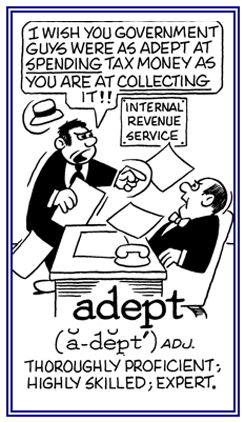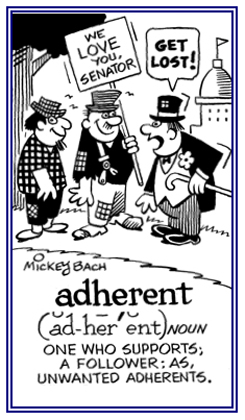ad-
(From Latin: "to, toward, a direction toward, an addition to, near, at"; and changes to: "ac-, af-, ag-, al-, an-, ap-, aq-, ar-, as-, at-" and ad- is also combined with certain words that begin with the letters c, f, g, l, n, p, q, r, s, and t.)
The Latin element ad carries the idea of "in the direction of" and combines with many Latin words and roots to make common English words.
2. Someone who is obsessed by and devoted to the habitual and excessive use of a narcotic: Tim's friend was found to be a drug addict when his parents found cocaine hidden in his bedroom.
Why is it that drug addicts and computer enthusiasts are both called "users"?
- Internet access has become a vital part of the modern world and an important tool in the education of children.
- Like addiction to drugs, alcohol, cigarettes, or caffeine, internet addicts are showing symptoms of increasing tolerance, withdrawal, mood changes, and interruption of social relationships.
- Children and adolescents who have become addicts of the internet often require increasing amounts of time online in order to feel satisfied.
- When they do not have access to the internet, they may have symptoms of withdrawal, which include anxiety, depression, irritability, trembling hands, restlessness, and obsessive thinking or fantasizing about the internet.
- Internet addiction is not limited just to introverted "computer-techies".
- The internet can provide a welcome escape for individuals who already suffer from a variety of psychological difficulties; including, anxiety, depression, and low self-esteem.
- Additionally, those who have struggled with other types of addiction may more easily become obsessed with the internet.
2. The process of adding, including, embracing; the act of joining, annexing, appending: The addition of a baby to the household changed the lives of the Johnson family!
3. Increase, enlargement, extra, augmentation: The addition in cost over last year’s tuition is $500.
4. Annex, wing, extension, adjunct: The addition to the town library will double its size.
Shirley was an adept author when writing her column in the local newspaper every day.
2. Etymology: from Latin adeptus, "attained, achieved".

Go to this Word A Day Revisited Index
so you can see more of Mickey Bach's cartoons.
2. In law, pertaining to a reasonable amount of proof for starting legal action: Frank and Violet had adequate grounds or justification for suing the hospital for incompetence.
3. Etymology: from Latin adæquatus, "equalized"; past participle of adæquare, "equalize"; from ad-, "to" + æquare, "to make level", from æquus.
2. Adhesion, adhesiveness, stickiness: Put more glue on the wallpaper to increase its adherence.
As a politician, the senator was a leader with many loyal adherents.
2. A substance that can stick firmly to a surface or an object, such as glue or wax: Jim was using a strong adherent on the broken parts of the wooden chair.
Go to this Word A Day Revisited Index
so you can see more of Mickey Bach's cartoons.
2. The property of sticking together, as of substances or tissues; the attachment of one thing to another: Glue and paste provide the means of adhesion as well as adhesive tape.
3. The grip of a wheel on a track, etc. which is produced by friction, or the friction itself: It was difficult to convince the elderly to write e-mails with the computer considering their adhesion to using a pencil or pen and paper for written communication.
4. The attachment to someone or an organization by remaining with it as a partizan, a supporter, or a follower: Patricia was honored for her adhesion as a worker for homeless people for so many years.
5. A mass of fibrous connective tissue in the body that joins two surfaces that are normally separate: Adhesions are usually scar tissues that have formed after an inflammation of some part of the anatomy, or the natural healing process that takes place after surgery.
Some abdominal adhesions bind loops of obstructions together and so they usually require the surgical cutting of the fibrous tissue in order to free them of the blockages.
Synthetic nanoadhesive mimics sticking powers of gecko and mussel
Geckos are remarkable for their ability to scurry up vertical surfaces and even move along upside down.
Their feet adhere temporarily, coming off of surfaces again and again like a sticky note; but put those feet underwater, and their ability to stick is dramatically reduced.
Water is an enemy of adhesives, which typically do not work well in wet environments; think of how long a bandage on your finger lasts. Now two Northwestern University biomedical engineers have successfully married the gecko’s adhesive ability with that of an animal well known for its sticking power underwater: the mussel.
Combining the important elements of gecko and mussel adhesion, the new adhesive material, called “geckel”, functions like a sticky note and exhibits strong yet reversible adhesion in both air and water.
“I envision that adhesive tapes made out of geckel could be used to replace sutures for wound closures and may also be useful as a water-resistant adhesive for bandages and drug-delivery patches.
Such a bandage would remain firmly attached to the skin during bathing but would permit easy removal upon healing,” said Phillip B. Messersmith, professor of biomedical engineering at Northwestern’s McCormick School of Engineering and Applied Science.
A gecko’s strong but temporary adhesion comes from a mechanical principle known as contact splitting.
Each gecko foot has a flat pad that is densely packed with very fine hairs that are split at the ends, resulting in a greater number of contact points than if the hairs were not split. In fact, the diameter of one of the split hairs is as small as 200 nanometers.
More contact points between hairs and surface result in a significant increase in the strength of adhesion. Flies, bees and other insects also use this strategy.
2. Characteristic of lying near, close, or touching something else; adjoining; neighboring: The two sisters had adjacent bedrooms which were connected by a door.
3. Etymology: from Latin adjacentem, adjacens; both of which are from adjacere, "to lie at, to border upon, to lie near"; from ad-, "to" + jacere, "to lie, to rest"; literally, "to throw".
2. Any member of a class of words that, in many languages, are distinguished in form, as partly in English, and which have comparative and superlative endings: Adjectives function as modifiers of nouns, such as "good", "wise", "perfect", "beautiful", "bad", "sad", "loud", etc.
The three most common adjectives are the articles: "a", "an", and "the". The "a" and "an" are the indefinite articles and refer to any one of a class of nouns. "The" is a definite article that refers to a specific noun.
Examples of the indefinite articles, or adjectives, are "a contest", and "an opportunity". A definite article sample is "the writer".
2. To be in contact with another building, room, area, etc.: The town church adjoins or is linked with the cemetery.
3. To share a common border with something, especially an area of land: The two families have gardens that adjoin each other.
4. Etymology: from Latin adjunctus, "closely connected, joined, united"; as a noun, "a characteristic, an essential attribute"; adjungere, "join to"; from ad-, "to" + jungere, "to bind together".


